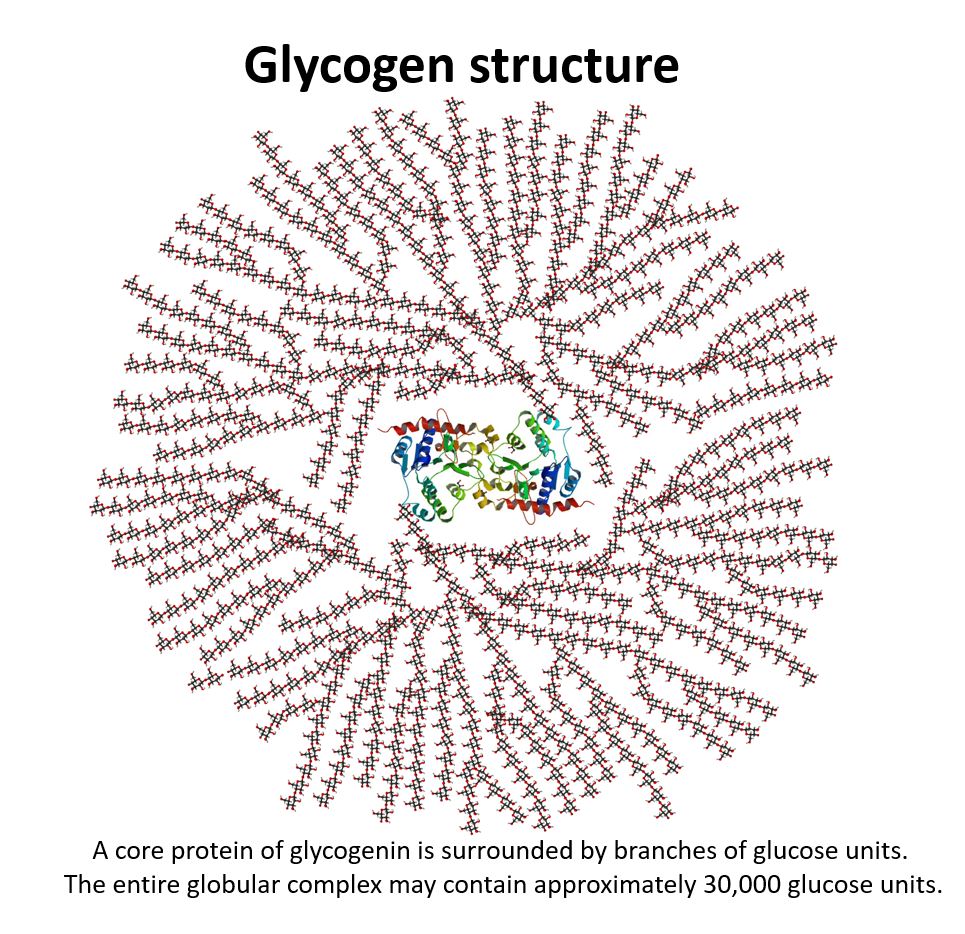Playlist
Show Playlist
Hide Playlist
Glycogen Metabolism: Insulin Signaling and Summary
-
06 Advanced CarbohydrateMetabolism3.pdf
-
Reference List Biochemistry.pdf
-
Download Lecture Overview
00:01 Now I wanna spend a little bit time talking about how we reverse all the process. 00:06 So a reversal of the process happens with another hormone. 00:09 And that another hormone is one that we all have heard about and that's insulin. 00:13 Insulin as we will see has the effect of countering the entire epinephrine glucagon system. 00:19 Now insulin stimulates an enzyme called phosphatase that I have mentioned earlier. 00:23 And what phosphatase does is it removes phosphates from the glycogen enzymes. 00:28 This favors glycogen synthesis; because, it was additional phosphate to the glycogen synthase that inactivated it. So removing the phosphate will activate it. 00:38 Conversely we take the phosphate off of glycogen phosphorylase and we will have the effect of reducing its activity. 00:46 Insulin also stimulates the uptake of glucose by cells and this is important; because, blood glucose can be hazardous for the body. So getting glucose out of the blood and into the cells is important. 00:58 In this figure we can see a little bit of the results of insulin action on cells. 01:02 We see in yellow that insulin binds to a receptor of its own called the insulin receptor. 01:07 That binding to the insulin receptor, stimulates several things to happen. Now, as I noted, the liver cells, one of the things that happens, is that they are stimulated to take up glucose from the blood stream. 01:18 The body treats glucose like it's a poison. 01:21 In some ways it may well be a poison; because, people who have trouble maintain their blood glucose levels have many problems. We know for example the issues associated with diabetes. 01:32 So maintaining proper glucose levels is important and insulin plays a role in that process. 01:38 We see insulin stimulates the movement of a protein called glucose transporter-4 to the cell surface and so that green dimer that you see on the cell surface has moved there as a result of the insulin action. 01:52 The glucose is brought into the cell when that happens and you can see the glucose concentration increasing. 01:58 Couple of things can happen with that. Glucose in the cell, again, the cell is now gonna treat it like it is a poison. 02:04 The cell deals with that glucose in two ways. 02:07 One is it reduces the free glucose concentration by making glycogen. 02:12 That takes glucose away out of the free system and makes glycogen and glycogen is not a problem. 02:18 In addition glycolysis is favored by the breakdown of glucose so that also has the effect of reducing the glucose concentration. 02:26 Now the by product of glycolysis in breaking down glucose is you make a lot of pyruvate. 02:32 If you are not getting plenty of exercise what happens is a lot of pyruvate gets converted into acetyl-CoA, and acetyl-CoA goes to fatty and you can probably figure out where that's headed. 02:44 So when glucose levels are high insulin decreases glucose concentration by favoring glycogen synthesis, as I noted, and by inhibiting glycogen breakdown. 02:56 So when glucose is needed, epinephrine does its job and stimulates the release of glucose from glycogen. 03:02 And when glucose is abundant, insulin stimulates the dephosphorylation of those same enzymes to use the glucose in either glycogen or glycolysis. 03:11 So maintaining sugar balance in the body is an essential function. 03:16 And in this lecture we have seen how glycogen metabolism is managed to help the body to manage its own glucose needs. 03:23 With these manage needs done properly, the body functions having glucose when necessary and being able to store glucose when there is an excess.
About the Lecture
The lecture Glycogen Metabolism: Insulin Signaling and Summary by Kevin Ahern, PhD is from the course Carbohydrate Metabolism.
Included Quiz Questions
Which of the following statements about insulin is NOT true?
- It stimulates the release of glucose from cells.
- It stimulates the activity of phosphatase.
- It stimulates the activity of glycogen synthase.
- It inhibits the activity of phosphorylase kinase.
Customer reviews
5,0 of 5 stars
| 5 Stars |
|
5 |
| 4 Stars |
|
0 |
| 3 Stars |
|
0 |
| 2 Stars |
|
0 |
| 1 Star |
|
0 |




